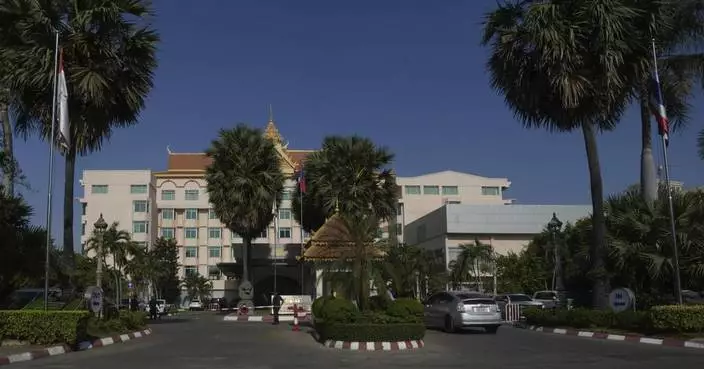The European Union describes wildfires as "a serious and increasing threat" across the continent.
Most alarmingly, forest blazes are growing in intensity, especially in southern countries such as Greece, Spain, France, Italy and Portugal but also in Scandinavia.
Click to Gallery
The European Union describes wildfires as "a serious and increasing threat" across the continent.
Here's a look at Europe's wildfire problem.
Portugal suffers more than most, recording over 18,000 wildfires a year since 2007. Huge blazes in 2017 killed at least 106 people.
These extreme blazes are characterized by the rapid spread of flames, intense burning, unpredictable shifts in direction and embers that are carried far away.
In Western Europe, people have been leaving the land and moving to the cities.
Experts warn the continent needs to get ready for blazes that reach a massive new scale. These superfires, or mega-fires, are catastrophic events that kill and blacken broad areas and are hard to stop.
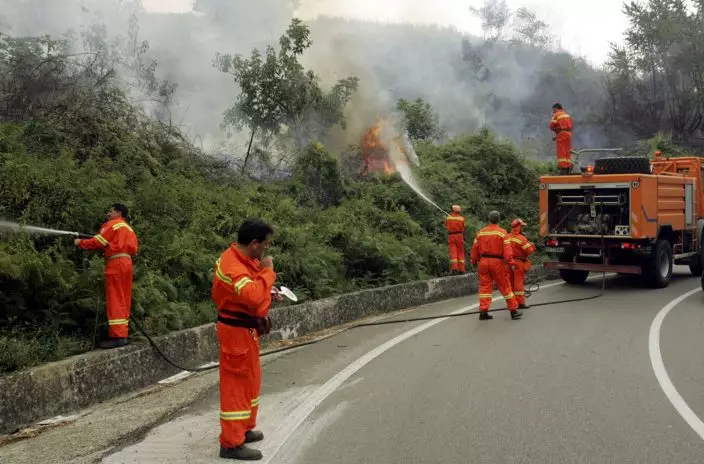
FILE - In this file photo dated Wednesday, July 25, 2007, firemen spray water over a wild fire in the Mount Pollino area, southern Italy, as some dozens of fires were raging in central and southern Italy with four people reported killed and destroying hundreds of hectares (acres) of forest. According to an EU report released in 2018, authorities are still using traditional methods to fight fires, relying on water to extinguish flames instead of investing in long-term efforts needed for prevention. (AP PhotoMario Tosti, FILE)
Here's a look at Europe's wildfire problem.
WHAT'S HAPPENING?
Between 2000 and 2017, 611 firefighters and civilians died in wildfires in European Union countries, with economic damage calculated at more than 54 billion euros ($60.5 billion).
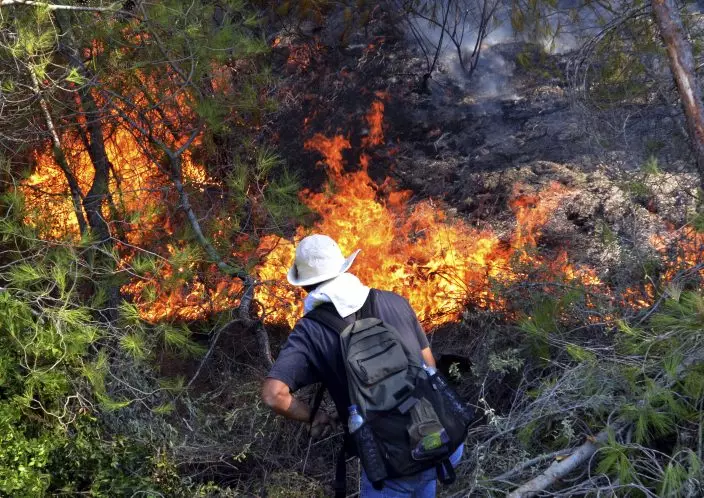
FILE - In this file photo dated Sunday July 28, 2013 a local man helps to fight a wildfire in southern Rhodes, Greece, after authorities declared a state of emergency on the holiday island after a weekend fire destroyed an estimated 4,000 hectares of forest and farmland. In 2019, experts say authorities must shift their firefighting focus from suppression to prevention, including the regular thinning of forests, creating fire breaks, introducing more climate-resilient plant species and education. (AP PhotoNicolas Nanev, FILE)
Portugal suffers more than most, recording over 18,000 wildfires a year since 2007. Huge blazes in 2017 killed at least 106 people.
Though the European trend is for fewer blazes and smaller areas charred, except in Portugal, bigger and meaner forest fires are stretching emergency assets and government budgets.
Added to that, the peak fire season is becoming longer, extending into June and October, with an increasing number of mega-fires.
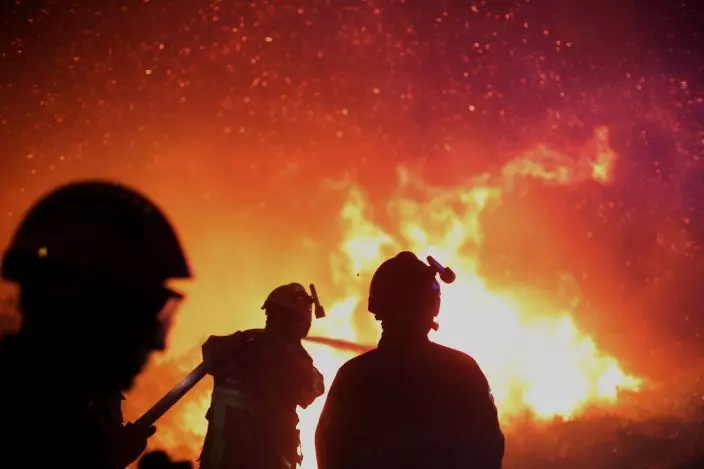
FILE - In this file photo dated Tuesday, July 25, 2017, firefighters spray water as they try to douse a fire near the village of Biguglia, Corsica island, France, as some hundreds of firefighters battle blazes fanned by high winds in more than a dozen zones in the Riviera region of southern France. European Union experts warn the continent needs to get ready for blazes that reach a massive new scale. (AP PhotoRaphael Poletti, FILE)
These extreme blazes are characterized by the rapid spread of flames, intense burning, unpredictable shifts in direction and embers that are carried far away.
But according to an EU report last year, authorities are still using traditional methods to fight fires, relying on water to extinguish flames instead of investing in long-term efforts needed for prevention.
WHAT'S CAUSING IT?
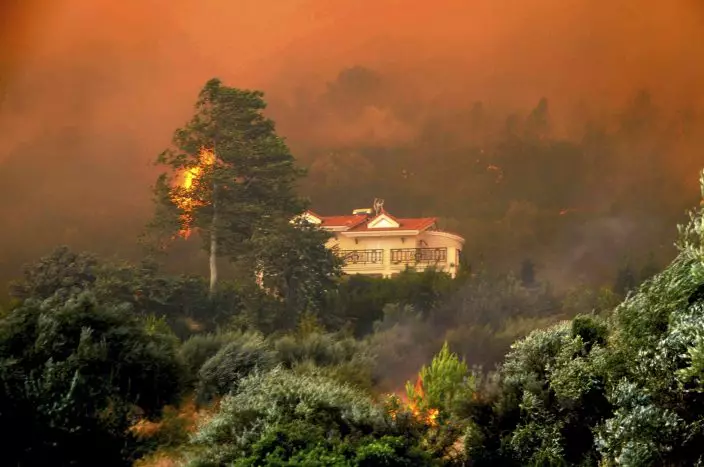
FILE - In this file photo dated Wednesday, July 18, 2012, a house is surrounded by flames during a wildfire near Patras, Greece, as regional authorities declared an emergency in southwestern Greece as nine planes and one helicopter were involved in the firefighting effort. Conifer forests and eucalyptus plantations are common in Europe and burn fiercely as climate change has bought severe droughts leaving forests tinder-dry and facilitating blazes. (AP PhotoGiannis Androutsopoulos, FILE)
In Western Europe, people have been leaving the land and moving to the cities.
Abandoned fields, pastures and forests have been left to themselves, becoming overgrown with what turns into fuel for wildfires.
Instead of a properly tended patchwork of different vegetation, some of which is more fire-resistant, large areas of countryside have dense and continuous forest cover which benefit and propagate blazes.
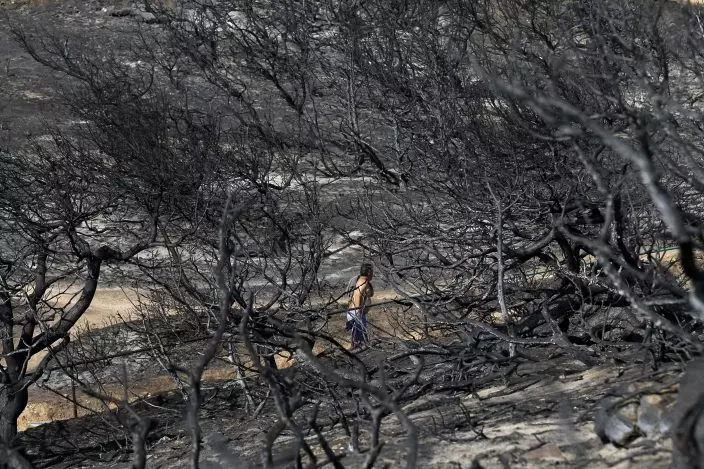
FILE - In this file photo dated Wednesday, Aug. 1, 2018, a man leaves a beach in Rafina, east of Athens, some ten days after a wildfire swept through the area leaving 76 people killed by Greece's deadliest wildfire in decades. Between 2000 and 2017, 611 firefighters and civilians died in wildfires in European Union countries, with economic damage calculated at more than 54 billion euros (dollars 60.5 billion). (AP PhotoThanassis Stavrakis, FILE)
Conifer forests and eucalyptus plantations, which provide income for landowners, are common and burn fiercely.
The spread of urban areas, meanwhile, has brought homes close to forests, and danger lies in the proximity.
In Greece last summer, an additional hazard came from lax oversight of urban planning. Illegally constructed buildings in woodland and coastal areas were a contributing factor in the deaths of 101 people in Mati, outside of Athens, where many drowned as they tried to swim away from intense heat and smoke engulfing beaches.
More severe droughts nowadays are leaving forests tinder-dry. Spells of unusually high temperatures are also facilitating blazes. Both of those challenges have come with climate change, with scientists saying that Sahara-like conditions are jumping the Mediterranean Sea into southern Europe.
Forest management policies work on a decades-long timescale and need to be more adaptable, EU authorities say.
Prevention "does not receive the necessary emphasis and funding compared to fire suppression," according to the EU, while "the preparedness of agencies and communities to deal with extreme fire events is often far from optimal."
WHAT CAN BE DONE?
Experts say authorities must shift their firefighting focus from suppression to prevention, taking into account aspects such as climate adaptation, education and preparedness.
That includes the regular thinning of forests and undergrowth; creating fire breaks; introducing more climate-resilient plant species; and ensuring diversified forests.
Preventively setting fire to countryside, called "prescribed burning," is regarded as an efficient prevention technique but is controversial in some countries. Greece prohibits it while others, such as France, Portugal and some regions of Spain and Italy allow it under certain conditions.
Technology is also being developed to help fight wildfires, including drones for detection, quick responses, mapping and assessing fire dynamics.
But the EU notes that fire management in Europe is "not making full use of the knowledge and innovation delivered by scientific projects."
The EU is urging governments to get a better grasp of how climate change is affecting their countries.
The European Forest Institute, established by 29 European countries, struck a gloomy note last year.
If authorities don't change the make-up of the countryside, the EFI said in a report, emergency services won't be able to stop what experts refer to as "6th generation wildfires" — commonly known as fire storms.
BEIRUT (AP) — The European Union announced Thursday an aid package for Lebanon of 1 billion euros — about $1.06 billion — that will mostly go to boost border control to halt the flow of asylum seekers and migrants from the small, crisis-wracked country across the Mediterranean Sea to Cyprus and Italy.
The deal follows other EU aid packages for countries such as Egypt, Tunisia and Mauritania to fortify their borders. It comes against a backdrop of increasing hostility toward Syrian refugees in Lebanon and a major surge in irregular migration of Syrian refugees from Lebanon to Cyprus.
European Union Commission President Ursula von der Leyen said during a Beirut visit with Cypriot President Nikos Christodoulides that the aid distribution will start this year and last till 2027.
The bulk of the aid — 736 million euros — would go to support Syrian refugees “and other vulnerable groups” in Lebanon, while 200 million euros are meant to bolster Lebanese security services in enforcing border and migration control, according to figures provided by the Cypriot government.
An unspecified amount would go to Lebanese fishermen, to discourage them from selling their boats to smugglers.
Von der Leyen said the EU will also work on a “more structured approach to voluntary return" of Syrian refugees "in close cooperation with” the U.N. refugee agency. The bloc will continue to maintain “legal pathways” for resettlement of refugees in Europe, she said.
Lebanon's Caretaker Prime Minister Najib Mikati praised the package, saying that “Lebanon’s security is security for European countries and vice versa,” and that an escalation of the crisis ”will not be limited to Lebanon but will extend to Europe."
Lebanon, which has been in the throes of a severe financial crisis since 2019, hosts nearly 780,000 registered Syrian refugees and hundreds of thousands more who are unregistered, the world's highest refugee population per capita.
Lebanese political officials have for years urged the international community to resettle the refugees in other countries or assist their return to Syria — voluntarily or not. Lebanese security forces have stepped up deportations of Syrians over the past year.
Tensions further flared after an official with the Christian nationalist Lebanese Forces party, Pascal Suleiman, was killed last month in what military officials said was a botched carjacking by a Syrian gang. The incident prompted outbreaks of anti-Syrian violence by vigilante groups.
Meanwhile, Cypriot authorities complain the island nation has been overwhelmed by irregular migration of Syrian asylum seekers, many of them coming on boats from Lebanon.
The UNHCR in Lebanon said it had verified 59 “actual or attempted” departures by boats carrying a total of 3,191 passengers from Lebanon between January and mid-April, compared to three documented boat movements carrying 54 passengers in the same period last year. Usually, few boats attempt the much more dangerous crossing in the winter. In all of 2023, UNHCR recorded 65 boat departures carrying 3,927 passengers.
Cyprus has taken a new approach to halting the flow of migrants. Last month, it suspended processing of Syrian asylum applications, and human rights groups accused the Cypriot coast guard of forcibly turning back five boats carrying about 500 asylum seekers coming from Lebanon. Cypriot officials have denied this.
Bassel al-Shayoukh, a Syrian refugee from Idlib living in Lebanon since 2014, said his brother and several cousins and nephews were on one of the boats turned back. Now he wants to make the journey himself.
“In the beginning I thought that in a year or two the war would be over in Syria,” he said, but it dragged on, while in Lebanon “every year ... the situation began to get worse.”
Shayoukh said he fears being beaten by vigilantes or deported to Syria after Lebanese authorities declined to renew his residency permit.
His 17-year-old nephew, who declined to give his name fearing for his safety, said the Cypriot coast guard started making waves to push the boat he was on away. “I was terrified... I don’t know how to swim,” he said. “I thought we were going to die.”
The people on the boats “stayed three days without food or water” before turning back to Lebanon, the teen added.
Back in Lebanon, they were detained by the army; those registered with UNHCR were released and the others deported.
Mohammed Sablouh, a Lebanese human rights lawyer who works on refugee and migrant cases, says Lebanese authorities are deliberately “turning a blind eye" to the surge in migration to "pressure the international community.”
The Lebanese army did not respond to a request for comment on their measures to combat smuggling.
Thursday's aid announcement comes ahead of the annual fundraising conference for Syria in Brussels later this month. After 13 years of civil war, donor fatigue has set in while the world’s attention is occupied by the humanitarian fallout of more recent conflicts in Ukraine and Gaza.
The Cypriot president said Thursday was a “historic day” and called for European officials to go farther and declare some areas of Syria safe for return.
“The current situation is not sustainable for Lebanon. It is not sustainable for Cyprus, it is not sustainable for the European Union,” Christodoulides said.
But not all Lebanese officials are convinced the European aid would solve the problem.
Lebanese Forces party head Samir Geagea told The Associated Press earlier this week that European authorities are mainly concerned “that the refugees don’t go to Europe."
"For us the problem is that we cannot have our country drowning in illegal Syrian refugees,” Geagea said, urging for Syrians to be sent back to either government or opposition-held areas of the neighboring country.
But Shayoukh says he has nowhere to go.
The Damascus government wants him for opposing Syrian President Bashar Assad, he said, while the Islamist group that now controls his hometown behaves "the same way as the regime’s intelligence services” in crushing dissidents.
Associated Press writer Menelaos Hadjicostis in Nicosia, Cyprus, contributed to this report.
Follow AP’s global migration coverage at: https://apnews.com/hub/migration

Lebanese caretaker Prime Minister Najib Mikati, center, speaks during his meeting with Cyprus' President Nikos Christodoulides, left, and President of the European Commission Ursula von der Leyen at the government palace in Beirut, Lebanon, Thursday, May 2, 2024. (AP Photo/Hassan Ammar)
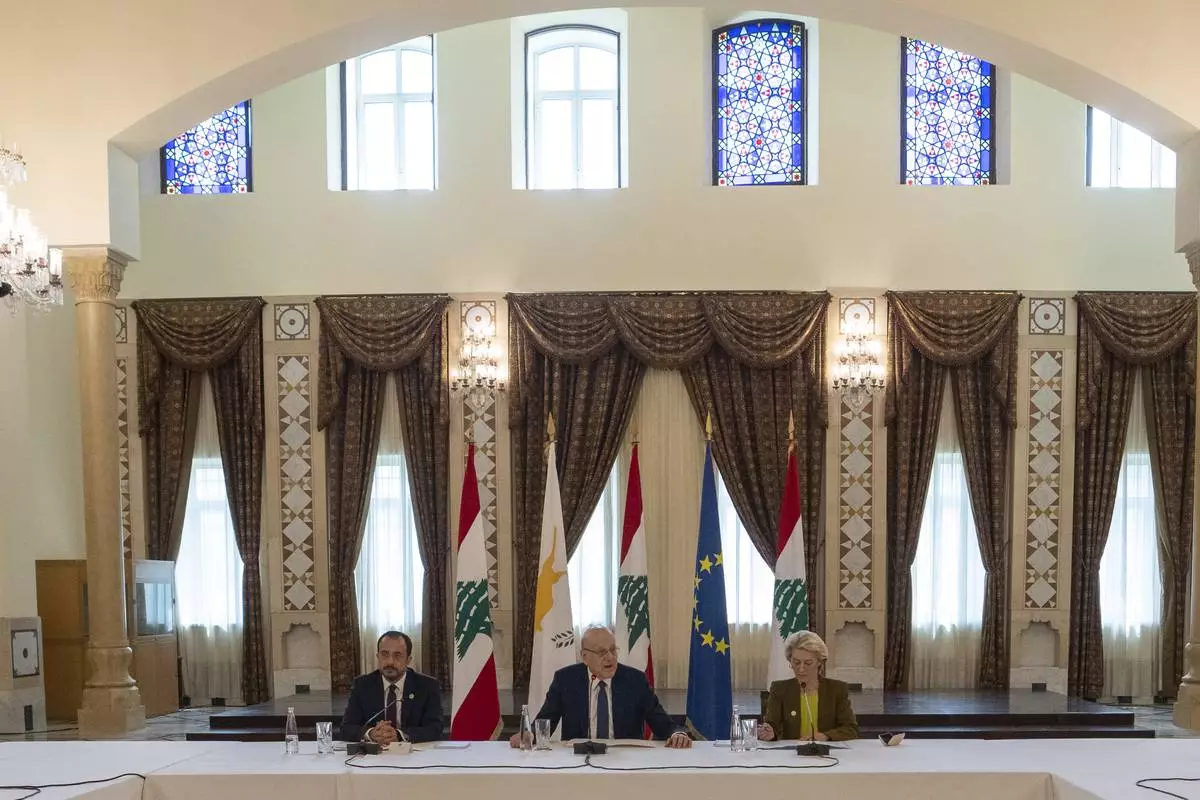
Lebanese caretaker Prime Minister Najib Mikati, center, speaks during his meeting with Cyprus' President Nikos Christodoulides, left, and President of the European Commission Ursula von der Leyen at the government palace in Beirut, Lebanon, Thursday, May 2, 2024. (AP Photo/Hassan Ammar)

Lebanese caretaker Prime Minister Najib Mikati, center, welcomes Cyprus' president Nikos Christodoulides, left, and President of the European Commission Ursula von der Leyen before their meeting at the government palace in Beirut, Lebanon, Thursday, May 2, 2024. (AP Photo/Hassan Ammar)

Lebanese caretaker Prime Minister Najib Mikati, center, Cyprus' President Nikos Christodoulides, left, and President of the European Commission Ursula von der Leyen pose for photograph at the government palace in Beirut, Lebanon, Thursday, May 2, 2024. (AP Photo/Hassan Ammar)

Lebanese caretaker Prime Minister Najib Mikati, right, welcomes Cyprus' president Nikos Christodoulides before their meeting at the government palace in Beirut, Lebanon, Thursday, May 2, 2024. (AP Photo/Hassan Ammar)

Cyprus' President Nikos Christodoulides, left, and President of the European Commission Ursula von der Leyen, center, review an honor guard upon their arrival to meet with the Lebanese Speaker Nabih Berri, in Beirut, Thursday, May 2, 2024. (AP Photo/Hussein Malla)

Lebanese caretaker Prime Minister Najib Mikati, center, speaks during his meeting with Cyprus' President Nikos Christodoulides, left, and President of the European Commission Ursula von der Leyen at the government palace in Beirut, Lebanon, Thursday, May 2, 2024. (AP Photo/Hassan Ammar)

Lebanese caretaker Prime Minister Najib Mikati, center, welcomes Cyprus' President Nikos Christodoulides, left, and President of the European Commission Ursula von der Leyen at the government palace in Beirut, Lebanon, Thursday, May 2, 2024. (AP Photo/Hassan Ammar)

















